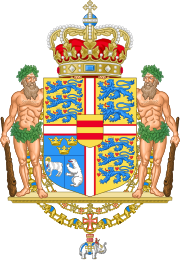
The Region of Southern Denmark is an administrative region of Denmark established on Monday 1 January 2007 as part of the 2007 Danish Municipal Reform, which abolished the traditional counties ("amter") and set up five larger regions. At the same time, smaller municipalities were merged into larger units, cutting the number of municipalities from 270 before 1 January 2007 to 98. The reform diminished the power of the regional level dramatically in favor of the local level and the central government in Copenhagen. The Region of Southern Denmark has 22 municipalities. The reform was implemented in Denmark on 1 January 2007, although the merger of the Funish municipalities of Ærøskøbing and Marstal, being a part of the reform, was given the go-ahead to be implemented on Sunday 1 January 2006, one year before the main reform. It borders Schleswig-Holstein (Germany) to the south and Central Denmark Region to the north and is connected to Region Zealand via the Great Belt Fixed Link.

The Vestre Landsret is one of Denmark's two High Courts, along with the Østre Landsret. Both High Courts function both as a civil and criminal court of first instance and a civil and criminal appellate court for cases from the subordinate courts.

A road church is a roadside church, one of a network of such churches in Denmark, Germany, Estonia, Finland, Norway, Russia and Sweden. The churches are kept open for tourists during the summer holiday season.
Arnold Busck, named after founder Arnold Busck, is a family-owned Danish company with activities in book distribution and publishing. The Arnold Busck chain of bookstores is one of the largest Danish book retailers with 30 stores.
The 2015–16 Danish Cup was the 62nd season of the Danish Cup competition. The winners of the competition qualified for the second qualifying round of the 2016–17 UEFA Europa League.
The 2016–17 Danish Cup was the 63rd season of the Danish Cup competition. Copenhagen won the tournament, earning qualification into the second qualifying round of the 2017–18 UEFA Europa League. However, as Copenhagen also won the 2016–17 Danish Superliga, Brøndby, the cup runners-up, were allotted the position.
The 2017–18 Danish Cup was the 64th season of the Danish Cup competition. Brøndby won the tournament, earning qualification into the third qualifying round of the 2018–19 UEFA Europa League.
The 2018–19 Danish Cup, also known as Sydbank Pokalen, was the 65th season of the Danish Cup competition. The winners of the tournament, Midtjylland, earned qualification into the third qualifying round of the 2019–20 UEFA Europa League.
The 1963–64 Danish Cup was the 10th installment of the Danish Cup, the national association football cup competition in Denmark. This year's edition began with the regional qualifying rounds among the lower ranking members of the six regional governing bodies in early May 1963, and concluded with the grand cup final on 7 May 1964. A total of 707 clubs participated in the cup tournament – the highest number of teams since the cup's foundation. 671 teams were registered for the qualifying rounds, of which only 44 teams would quality for the proper rounds, under the auspices of the Danish FA's tournament committee, joined by 36 additional teams from the first, second and third divisions in the Danish football league system.

The 2020–21 Danish Cup, also known as Sydbank Pokalen, was the 67th season of the Danish Cup competition.
The 1963–64 Danish Cup qualifying rounds inaugurated the 10th season for the Danish Cup. The qualifying rounds of the cup tournament were governed by the six regional football associations, the Bornholm FA, Copenhagen FA, Funen FA, Jutland FA, Lolland-Falster FA and Zealand FA. 671 teams were registered for the qualifying rounds, of which only 44 teams would quality for the proper rounds, under the auspices of the Danish FA's tournament committee, joined by 36 additional teams from the first, second and third divisions in the Danish football league system. The Danish FA dictated that the ticket prices to the qualifying matches should be at least DKK 2 for adults and DKK 1 for children.
The 1964 Jutland Series was the 66th edition of the Danish fifth-tier association football division since its establishment in 1902. Governed by the Jutland Football Association (JBU), the season was launched on 30 March 1964, and the last round of regular league matches concluded on 8 November 1964, with the league championship final being played on 15 November 1964. Silkeborg IF, Vorup Frederiksberg BK, Brande IF and Holstebro BK entered as relegated teams from last season's fourth-tier, while Hobro IK, Vejen SF, Viborg FF (reserves) and Aabyhøj IF Thrott entered as promoted teams from the 1963 JBUs Serie 1. Fixtures for the 1964 season were announced on 13 March 1964, 2½ weeks prior the season's start. The league featured reserve teams for higher ranking league clubs, whose players could indiscriminately be used on both the league and reserve teams, after a quarantine period of one match day.

The 2021–22 Danish Cup, also known as Sydbank Pokalen, is the 68th season of the Danish Cup competition. The winner is qualified for the Europa League play-off round.

The 2024–25 Danish Cup, also known as Oddset Pokalen, is the 71st season of the Danish Cup competition.
The 2024–25 season of the Kvindepokalen is the 32nd iteration of the Danish domestic women's cup competition.








